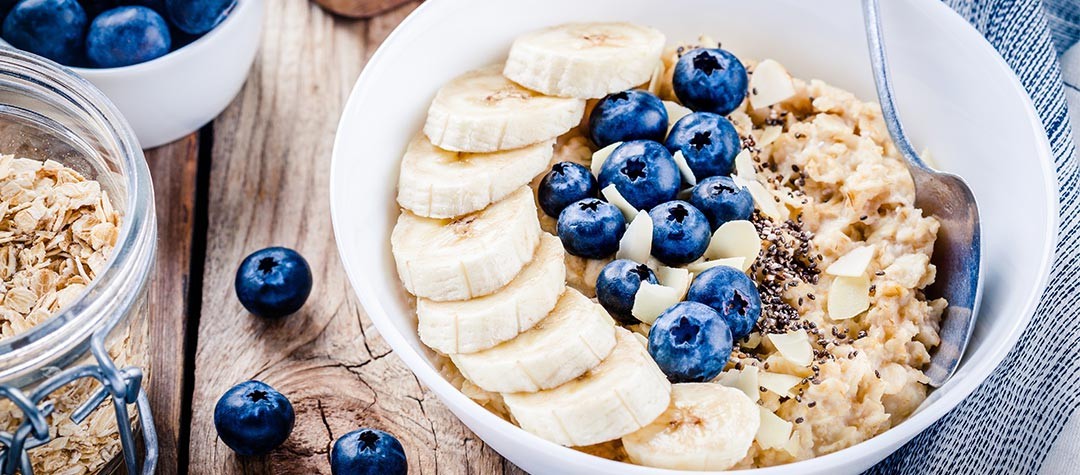Nutrition for swimmers can be a complex area and sometimes confusing area. Swimmer Adam Walker provides some fuelling advice for swimmers based on his experiences and focusing on carbohydrates as an energy source.
Carbo loading up to three days before your race is recommended to maximise your carbohydrate calories. So why carb load? The answer is to increase the amount of fuel stored in the muscles in order to perform for a sustained amount of time.
In order to maximise the benefit from carb loading, aim to minimise your exercise during this time, in order to benefit from the fuel stores. The amount of carbs required is dependent on body weight but as a guide a few days before, consume around 3.5 to 5.5 grams of carbohydrate per pound of body weight. It’s also very important to make sure you drink plenty of water and avoid alcohol which can dehydrate you.
What carbs to eat?
Now you shouldn’t just eat any carbs, it’s important to eat the right ones. There are simple and complex carbohydrates to consider:
- Complex carbs are fibrous foods such as grains, seeds, vegetables and provide sustainable energy.
- Simple carbohydrates such as pizzas, burgers, fizzy drinks that provide rapid absorption and can provide a quick boost of energy. However, they come with disadvantages, for instance a high increases in blood sugar levels and when those levels drops you will feel lethargic and tired and therefore no sustained energy.
Nutrition isn’t all about carbs
Nutrition for swimming isn’t just about having a plate of pasta, it is also very important to incorporate vegetables and protein to get all the right vitamins. Steamed vegetable have antioxidants and essential vitamins to aid performance.
Kale is excellent, it is a member of the cabbage family. It contains a high level of vitamin A, K, B6, calcium and iron. It helps regulate the body’s inflammatory process. Kale also contains carotenoids and flavonoids two powerful antioxidants that protect cells from free radicals which can cause stress.
It’s also important to incorporate some fruits prior to the event, such as cherries, which science has show to aid performance with less muscular soreness during competitions, as well as one of the most antioxidant rich fruits. They all contain anti-flammatory components which aid recovery.
Before your swimming event
So let’s have a look at potential breakfast options the morning of the race. I recommend oatmeal or porridge to provide a slow release in energy. It has a high soluble fibre content.
I recommend oatmeal or porridge to provide a slow release in energy.
Porridge is also a good source of protein and has a low glycemic index which provides again provides a sustained release of energy into the bloodstream. In addition porridge provides the body with vitamin B is rich in minerals and antioxidants . There is approximately 33 grams of carbohydrate within 300 grams of porridge oats.
If porridge isn’t to your taste, I’d recommend bananas. Although sugary, they have around 23g of carbohydrate per 100g of banana. They also contain a good amount of fibre to slow the carb release down.
You should have a 2 hour gap after your last meal, in order to allow the stomach to settle and digest.
After your swimming race
It is important to get both carbohydrate and protein in order to recover after a race.
As we know, carbohydrates are the body’s main fuel and are stored as glycogen in the muscles. After exercise stores will be depleted and will need to be replaced before your next workout session.
Taking protein on board after exercise provides the building blocks for growth and repair, and can reduce muscle soreness the following day.
Protein is vital for the growth and repair of muscle tissue. After the race there will naturally be breakdown of the muscle tissue, which is made from protein. Taking protein on board after exercise provides the building blocks (amino acids) for growth and repair, and can reduce muscle soreness the following day.
So what are the best types of foods for recovery for swimmers?
Snacks: Recovery drinks help replenish with a mixture of carbohydrates, vitamins and proteins. In addition there are protein bars that also recover in a similar way.
Main meals: Incorporating protein into your meal well help repair muscles. Goods like fish, lean chicken, turkey, eggs and low fat cheese. You should also incorporate some carbohydrates such as wholegrain pasta.
As well as eating the right recovery foods, it’s also important to remember to rest up well the day after an event.
Happy Competing!
















